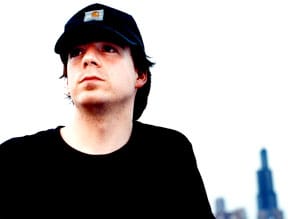"Establishing a work ethic by making rock'n'roll is essential to me," says Jason Molina, the man behind Songs: Ohia. "I grow a lot as a person just by working - something sustaining, not in a monetary or image way, but [living] a positive, creative life." Despite the slack exterior of his body of work - slowcore landmarks that resonate equally with lovers of both torch and twang - Molina is a prolific troubadour, a journeyman who will throw down his songbook with any group of musicians willing to spend a day learning some arrangements and rolling some tape.
And a day is all it takes. On more than a half-dozen albums now, Molina has recorded his brilliant, intimate songs in one-day sessions, habitually with musicians he doesn't know well and may have just met. (Collaborators have included members of Arab Strap, Boxhead Ensemble, Appendix Out and Lullaby For the Working Class.) But rather than choose backing bands for their skill, he does the opposite - for last year's amazing Didn't It Rain, he invited members of bluegrass band Jim and Jennie and the Pinetops, and asked them to leave the bluegrass at home. For his latest, The Magnolia Electric Co., he's in full-on rock band mode, channelling Gold Rush-era Neil and Johnny Cash through My Morning Jacket and Will Oldham. But having hired a kickin' rock band to back him in concert, he's now in the process of beating the rock out of them.
For him, it's the challenge. He's had no formal training and plays guitar in an unorthodox tuning, so even the simplest communication with musicians is difficult - much less ones you've just met, playing songs for the first time. One or two takes and moving on is his goal. "I make records because I need to make the songs concrete. I never think about it as a thing that people dig out six or seven years later - that's stuff I literally haven't heard since the day I recorded it. That doesn't mean I'm unattached to that music, but I walk out of the studio and start working on the next thing." The creative process is what's important to Molina. "I'm not necessarily searching for something in music by searching with music."
And a day is all it takes. On more than a half-dozen albums now, Molina has recorded his brilliant, intimate songs in one-day sessions, habitually with musicians he doesn't know well and may have just met. (Collaborators have included members of Arab Strap, Boxhead Ensemble, Appendix Out and Lullaby For the Working Class.) But rather than choose backing bands for their skill, he does the opposite - for last year's amazing Didn't It Rain, he invited members of bluegrass band Jim and Jennie and the Pinetops, and asked them to leave the bluegrass at home. For his latest, The Magnolia Electric Co., he's in full-on rock band mode, channelling Gold Rush-era Neil and Johnny Cash through My Morning Jacket and Will Oldham. But having hired a kickin' rock band to back him in concert, he's now in the process of beating the rock out of them.
For him, it's the challenge. He's had no formal training and plays guitar in an unorthodox tuning, so even the simplest communication with musicians is difficult - much less ones you've just met, playing songs for the first time. One or two takes and moving on is his goal. "I make records because I need to make the songs concrete. I never think about it as a thing that people dig out six or seven years later - that's stuff I literally haven't heard since the day I recorded it. That doesn't mean I'm unattached to that music, but I walk out of the studio and start working on the next thing." The creative process is what's important to Molina. "I'm not necessarily searching for something in music by searching with music."




